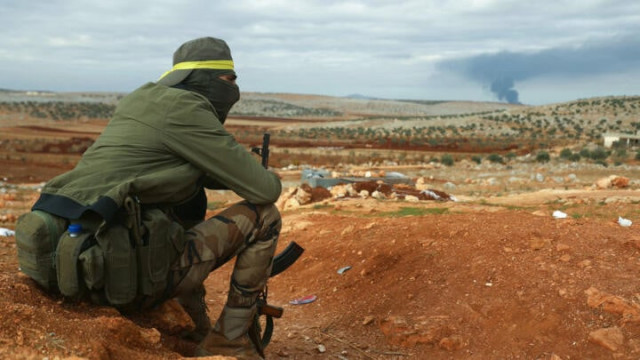Hayat Tahrir al-Sham capture Hama, two other towns in push toward Damascus
HTS leader Abu Mohammed al-Jolani, reiterated that the goal is to remain the toppling of Assad's regime

Syrian insurgents have made significant gains, advancing towards the capital, Damascus, after capturing key towns north of Homs, Syria's third-largest city. Led by the group Hayat Tahrir al-Sham (HTS), the militants seized Hama on Thursday and quickly captured two towns on the road south, eventually reaching Al-Dar al-Kabera, just five miles from Homs.
The Russian embassy in Damascus has urged Russian nationals to leave Syria, a rare move signaling growing concern. Moscow has long been a staunch ally of President Bashar al-Assad, providing military support in the ongoing conflict. Airstrikes on the Hama countryside were attributed to Russian and Syrian forces, while a Russian strike reportedly destroyed a bridge along the key highway leading into Homs.
In Istanbul, Turkish President Recep Tayyip Erdoğan expressed support for the insurgency, saying, “Idlib, Hama, Homs and after that most probably Damascus … we hope this march in Syria will continue without any issues.” Turkish, Iranian, and Russian foreign ministers are set to meet in Doha for urgent discussions on the crisis.
Homs, strategically located near the Lebanese border and Assad’s heartland, is seen as a critical point in the insurgents’ push south. The city has witnessed intense battles in the past, and insurgents have called on the people of Homs to rise against the regime, declaring, “your time has come.” As fighting intensifies, thousands of civilians have fled toward Damascus or the coastal province of Latakia.
The insurgents' rapid advance has already seen Aleppo and Hama fall under their control, marking the first time both cities have been fully under opposition control since the civil war began in 2011. The Syrian government's forces, already stretched thin, are reportedly struggling to hold their positions, with rebellion spreading to Daraa in the south and a security checkpoint being seized by local rebel groups.
In eastern Syria, reports suggest that Syrian government forces have handed over control of Deir ez-Zor's city centre to Kurdish militants. Meanwhile, the Turkish state news agency Anadolu reported rising activity from Islamic State militants in the area.
Syrian Defence Minister Ali Mahmoud Abbas referred to the retreat from Hama as a "temporary tactical measure," aimed at saving lives, while sources told Reuters that Hezbollah, a key ally of Assad, has sent forces to prevent the insurgents from taking Homs.
Iran, another key ally of the Syrian regime, has indicated that it may send military equipment and more advisers to Syria. Iran’s Foreign Minister Abbas Araghchi is scheduled for talks in Baghdad, as Iraq fears the conflict could spill over into its territory.
HTS leader Abu Mohammed al-Jolani, in a message to the Iraqi government, reassured that the fighting would not extend into Iraq, but reiterated that the goal of the insurgency remains the toppling of Assad's regime. "It is our right to use all available means to achieve that goal,” he told CNN.
Syrian insurgents have made significant gains, advancing towards the capital, Damascus, after capturing key towns north of Homs, Syria's third-largest city. Led by the group Hayat Tahrir al-Sham (HTS), the militants seized Hama on Thursday and quickly captured two towns on the road south, eventually reaching Al-Dar al-Kabera, just five miles from Homs.
The Russian embassy in Damascus has urged Russian nationals to leave Syria, a rare move signaling growing concern. Moscow has long been a staunch ally of President Bashar al-Assad, providing military support in the ongoing conflict. Airstrikes on the Hama countryside were attributed to Russian and Syrian forces, while a Russian strike reportedly destroyed a bridge along the key highway leading into Homs.
In Istanbul, Turkish President Recep Tayyip Erdoğan expressed support for the insurgency, saying, “Idlib, Hama, Homs and after that most probably Damascus … we hope this march in Syria will continue without any issues.” Turkish, Iranian, and Russian foreign ministers are set to meet in Doha for urgent discussions on the crisis.
Homs, strategically located near the Lebanese border and Assad’s heartland, is seen as a critical point in the insurgents’ push south. The city has witnessed intense battles in the past, and insurgents have called on the people of Homs to rise against the regime, declaring, “your time has come.” As fighting intensifies, thousands of civilians have fled toward Damascus or the coastal province of Latakia.
The insurgents' rapid advance has already seen Aleppo and Hama fall under their control, marking the first time both cities have been fully under opposition control since the civil war began in 2011. The Syrian government's forces, already stretched thin, are reportedly struggling to hold their positions, with rebellion spreading to Daraa in the south and a security checkpoint being seized by local rebel groups.
In eastern Syria, reports suggest that Syrian government forces have handed over control of Deir ez-Zor's city centre to Kurdish militants. Meanwhile, the Turkish state news agency Anadolu reported rising activity from Islamic State militants in the area.
Syrian Defence Minister Ali Mahmoud Abbas referred to the retreat from Hama as a "temporary tactical measure," aimed at saving lives, while sources told Reuters that Hezbollah, a key ally of Assad, has sent forces to prevent the insurgents from taking Homs.
Iran, another key ally of the Syrian regime, has indicated that it may send military equipment and more advisers to Syria. Iran’s Foreign Minister Abbas Araghchi is scheduled for talks in Baghdad, as Iraq fears the conflict could spill over into its territory.
HTS leader Abu Mohammed al-Jolani, in a message to the Iraqi government, reassured that the fighting would not extend into Iraq, but reiterated that the goal of the insurgency remains the toppling of Assad's regime. "It is our right to use all available means to achieve that goal,” he told CNN



















COMMENTS
Comments are moderated and generally will be posted if they are on-topic and not abusive.
For more information, please see our Comments FAQ